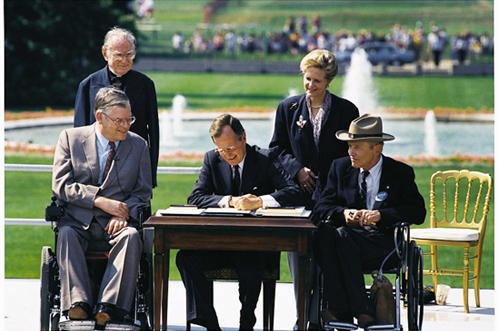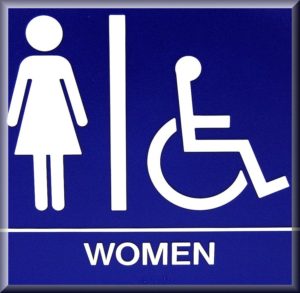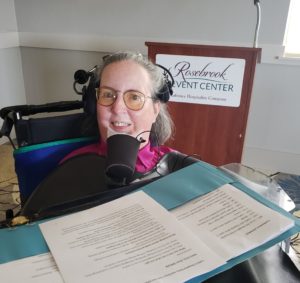Employment and Disability: Navigating the Obstacles
I was not your typical little kid. I didn’t crawl. I didn’t walk. I didn’t hold my head up very well. I didn’t dress myself or go to the bathroom without significant help from someone else.
Fortunately, my parents set a pattern for my life by focusing on the things I did well. I was interested in everything. I enjoyed doing crafts, especially drawing, knitting and crocheting. I loved reading and thought I might become a writer someday.
Before I was five I knew I was headed for college. I assumed that after earning my degree, I would get a full-time job and become financially self-sufficient. There are people with severe disabilities who are able to make that work.
For me, however, graduating from college was like running into a brick wall. All the success of school—the praise of professors, the good grades, the awards —seemed to mean nothing in the real world.

Before the Americans with Disabilities Act made discrimination illegal, interviewers appeared less interested in whether I could do the job than whether I could reach files that were kept up high and out of my reach.
 To further complicate things, my disability made a 9-5 workday seem impossible. Eating lunch and going to the bathroom were far more time-consuming for me than they would be for a nondisabled person. I am talking hours, not minutes. Again, there are people who work full-time in spite of obstacles like this, but I have never been able to figure it out. insert photo
To further complicate things, my disability made a 9-5 workday seem impossible. Eating lunch and going to the bathroom were far more time-consuming for me than they would be for a nondisabled person. I am talking hours, not minutes. Again, there are people who work full-time in spite of obstacles like this, but I have never been able to figure it out. insert photo
After being stuck for a couple of years, I met some people who were like my parents: focused on what I could do instead of on what got in the way. They gave me writing assignments and opportunities to speak. Other people liked my approach and offered me more work. I learned to facilitate groups, and to mentor individuals and families around independent living, personal supports, and self-advocacy.
These activities soon turned into a consulting business. Entrepreneurship seemed to be the answer to my scheduling problems. I still could not squeeze 40 hours of employment into my week. There were days when I could not work at all or could only do a couple of hours. Nevertheless, I was able to create products that were unique and of high quality. I never got rich, but I was able to pay my bills.
Expectations are great things, but…growing up believing that I would be enormously successful had its downside. No matter how often people told me they loved my work, I did not feel at ease. Inside, I was beating myself up for not working full time and not earning enough to get off of Social Security Disability.
So when I was offered a full-time job with almost infinite flexibility, I jumped at it. This opportunity came through a five-year grant with a focus on removing barriers to employment. It was a worthwhile project, but I was uncomfortable being cast as a role model of how to be gainfully employed while severely disabled. I was expected to share this knowledge with others when I did not have a full grasp of it myself.
Although I felt like a fraud, I did my best to satisfy the requirements of the job. No one ever said anything negative about my work, but I could not continue to accept a full-time salary when the realities of my life prevented me from working more than 10-15 hours a week. So I renegotiated my contract to work less hours. This felt better to me. I was no longer expected to get out there and show them how working and disability fit together. Instead, I was assigned several major writing projects which I still take pride in.
I was spared the brunt of the 2008 recession because I was in the middle of this five-year grant. When my contract ended, however, I discovered that many of the nonprofit organizations I had frequently worked with had closed. Others had merged or rebranded themselves, and the services I had provided them in the past were no longer needed. Similarly, the state was in trouble financially and there were no longer the disability training and mentoring dollars upon which I had built my career.
For seven years I wandered around trying to figure out how to get my business back to how it was before. Although I had occasional speaking or facilitating gigs, they were one-day commitments and did not lead to other work.
I had lived a can-do kind of life, and now I started to hear something in my head that I had never heard before: I CAN’T.
Then last March, one of my personal assistants started playing YouTube videos of motivational speakers while she was getting me up. I was reminded that people do all sorts of extraordinary things in spite of great obstacles. The difficulties are real, but they can be surmounted when faced head-on with creativity, determination, and confidence.
As a disabled worker, I am challenged daily to navigate these obstacles:
 Time: Everything I do takes longer. Some people may be able to roll out of bed, wolf down breakfast, and get to work in an hour. I need to budget almost four hours in the morning and two hours in the evening. This is just for eating, transferring between wheelchair and bed, performing personal hygiene, and bathroom needs. In the afternoon I need another couple of hours for personal care. So assuming that there are no other surprises (i.e.: equipment breakdown, power failure, unexpected visitor, or lung or belly problem), that leaves me about five hours a day at most to do everything else. “Everything else” includes working, but also the priorities listed below.
Time: Everything I do takes longer. Some people may be able to roll out of bed, wolf down breakfast, and get to work in an hour. I need to budget almost four hours in the morning and two hours in the evening. This is just for eating, transferring between wheelchair and bed, performing personal hygiene, and bathroom needs. In the afternoon I need another couple of hours for personal care. So assuming that there are no other surprises (i.e.: equipment breakdown, power failure, unexpected visitor, or lung or belly problem), that leaves me about five hours a day at most to do everything else. “Everything else” includes working, but also the priorities listed below.- Staffing: Unless there is someone to provide physical support, nothing else can happen. Not eating, not responding to email, not picking up groceries, and not working. Advertising, interviewing, hiring, training, and scheduling all take time. When someone calls out, the first thing I have to do is get that shift resolved. I often tell people I run a home care agency in my free time.
- Bureaucracy: Being disabled results in an unbelievable amount of paperwork and phone calls. Employing assistants to provide personal care involves not only forms and phone calls for the payroll company, but often unemployment and child support agencies, and sometimes the landlord. Some disability benefits require proof that one is NOT working and/or earning enough to be self-sufficient. Other benefits require proof that one IS working and/or earning enough to qualify for programs that are only available to disabled people who are employed. On top of that, there are calls to insurance companies, reordering of medical supplies, and ordering and repair of equipment.
- Finding that Employment Niche: Looking for work isn’t easy for anyone, but many fields are simply closed to me. I will never be a chef or a chauffeur. I cannot mow lawns or paint houses. Although I offer amazing problem-solving skills, outside-the-box thinking, attention to detail, patience, and unwillingness to give up, it has never been easy to find the right vocational fit. With many telecommuting, entrepreneurial, and other jobs now possible through cyberspace, there is increased potential for me to work flexible positions from home. As an older non-techie, however, it has been difficult for me to find or create those opportunities.
- Distraction: All of this takes up a lot of room in my head. I always have to have one eye on the staffing situation, another eye on the paperwork, another eye on the financial requirements, and yet another eye on employment opportunities. It’s good I wear glasses because I need to have at least four eyes open at all times!
It’s easy to look at this list and feel discouraged about the impact of disability on employment. For most of the last seven years, I have been doing exactly that. Yes, I have hung out with friends, done fun things, and volunteered for causes that are close to my heart. In general, I do not regret my journey through the desert.
But that cannot be the end of my employment story. I have many skills and much experience. For the first time in years, I am motivated to find work and to excel at it.

I am familiar with research that shows how working boosts self-esteem, improves physical and mental health, and creates social opportunities as well as the reward of a paycheck.
Most importantly, when I am working on an article or giving a talk, I am in the zone. Scheduling and staffing problems may still be there, but they sink into the background.
Today is the day to look beyond the obstacles and take the next step.

Photo by Savana Jones
Footnote: The author wrote those words about taking the first step in March. In April she had a speaking gig that brought additional business contacts. Very impressive.
About the Author: Cathy Ludlum is a freelance writer and speaker whose perspective has been shaped by her disability. She lives independently with support, and mentors others in similar situations. She has written several books, including One Candle Power: Seven Principles that Enhance the Lives of People with Disabilities and Their Communities.